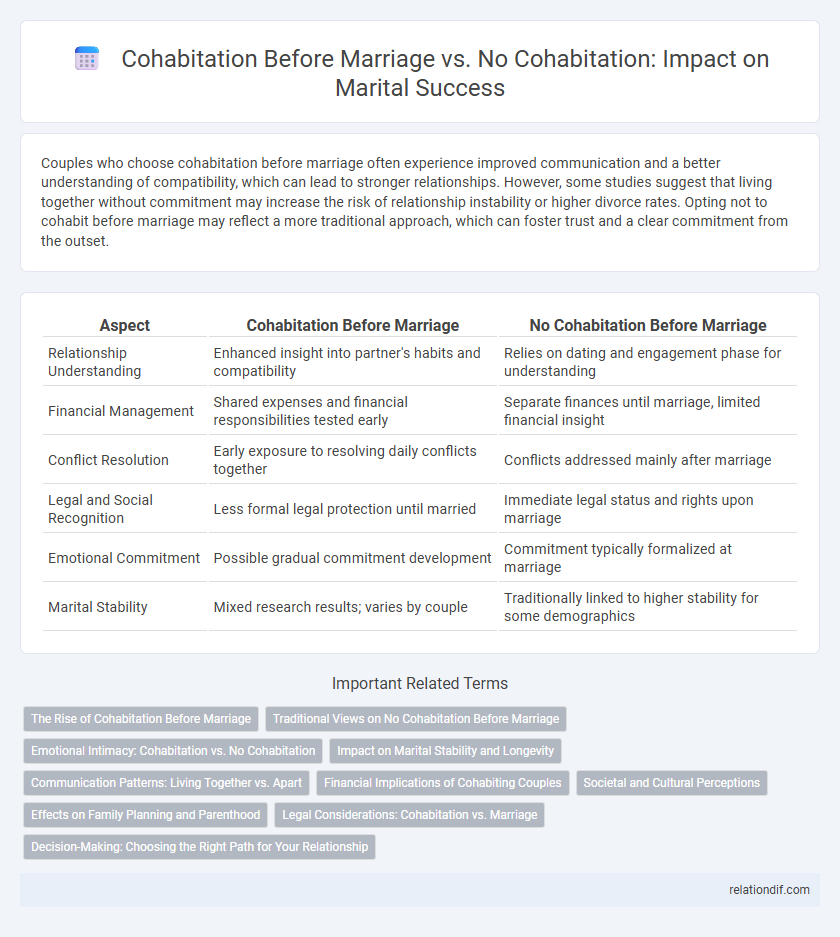Couples who choose cohabitation before marriage often experience improved communication and a better understanding of compatibility, which can lead to stronger relationships. However, some studies suggest that living together without commitment may increase the risk of relationship instability or higher divorce rates. Opting not to cohabit before marriage may reflect a more traditional approach, which can foster trust and a clear commitment from the outset.
Table of Comparison
| Aspect | Cohabitation Before Marriage | No Cohabitation Before Marriage |
|---|---|---|
| Relationship Understanding | Enhanced insight into partner's habits and compatibility | Relies on dating and engagement phase for understanding |
| Financial Management | Shared expenses and financial responsibilities tested early | Separate finances until marriage, limited financial insight |
| Conflict Resolution | Early exposure to resolving daily conflicts together | Conflicts addressed mainly after marriage |
| Legal and Social Recognition | Less formal legal protection until married | Immediate legal status and rights upon marriage |
| Emotional Commitment | Possible gradual commitment development | Commitment typically formalized at marriage |
| Marital Stability | Mixed research results; varies by couple | Traditionally linked to higher stability for some demographics |
The Rise of Cohabitation Before Marriage
Cohabitation before marriage has seen a significant rise, with studies indicating that over 60% of couples in the United States choose to live together prior to tying the knot. Research from the National Center for Family & Marriage Research shows that cohabiting couples often report higher relationship satisfaction and better communication skills compared to couples who do not live together before marriage. This shift reflects changing social norms and increased acceptance of premarital cohabitation as a step in relationship development.
Traditional Views on No Cohabitation Before Marriage
Traditional views on no cohabitation before marriage emphasize preserving moral values and religious beliefs that regard living separately until wedlock as essential for maintaining purity and commitment. Many cultures consider premarital cohabitation as a potential threat to the sanctity of marriage and family stability, advocating for waiting until formal vows are exchanged. Research indicates that couples adhering to no cohabitation often report higher marital satisfaction and stronger long-term relationship stability.
Emotional Intimacy: Cohabitation vs. No Cohabitation
Cohabitation before marriage often fosters higher levels of emotional intimacy by enabling couples to experience daily life challenges and routines together, promoting deeper understanding and communication. In contrast, couples who do not cohabit prior to marriage may develop emotional intimacy more gradually, relying heavily on intentional quality time and verbal exchanges to build connection. Studies indicate that couples who live together before marriage report enhanced empathy and conflict-resolution skills, which strengthen emotional bonds over time.
Impact on Marital Stability and Longevity
Studies indicate couples who cohabit before marriage show a slightly higher risk of marital instability and divorce compared to those who do not cohabit before tying the knot. Factors such as commitment levels, age at first cohabitation, and reasons for living together pre-marriage significantly influence the relationship between cohabitation and marital longevity. Longitudinal data suggest that couples with deliberate, intentional cohabitation aligned with marriage plans tend to experience marital stability similar to non-cohabiting counterparts.
Communication Patterns: Living Together vs. Apart
Cohabitation before marriage often fosters more frequent and diverse communication patterns, allowing couples to address conflicts and daily routines in real time, which can enhance mutual understanding and problem-solving skills. Couples living apart may experience less spontaneous interaction, leading to more intentional but potentially less frequent communication that can either strengthen emotional anticipation or cause misunderstandings. Studies show that cohabiting couples develop negotiation and compromise strategies earlier, while couples who do not cohabit tend to rely more heavily on verbal clarity and scheduled conversations to maintain relationship satisfaction.
Financial Implications of Cohabiting Couples
Cohabiting couples often experience shared financial responsibilities that can reduce individual expenses and improve economic stability, such as joint rent and utility payments. However, lack of legal protections in cohabitation compared to marriage may expose partners to financial risks, including asset disputes and limited rights in debt liability. Understanding the financial implications of cohabitation is crucial for couples to plan asset management, emergency funds, and future investments effectively.
Societal and Cultural Perceptions
Cohabitation before marriage often faces varied societal and cultural perceptions, with some cultures viewing it as a practical step toward compatibility, while others consider it taboo or morally inappropriate. Statistical data reveals that in Western societies, about 60% of couples cohabit before marriage, reflecting increasing acceptance, whereas more traditional cultures maintain strong stigma against it. These contrasting perceptions significantly influence relationship dynamics and societal judgment, shaping norms around commitment and family structure.
Effects on Family Planning and Parenthood
Cohabitation before marriage influences family planning by providing couples with valuable insights into compatibility, communication, and conflict resolution, which can lead to more informed decisions about parenthood timing and readiness. Studies show that couples who live together before marrying often experience fewer surprises related to parenting expectations and financial responsibilities, resulting in smoother transitions to parenthood. Conversely, couples who do not cohabit may face a steeper adjustment period after marriage, potentially impacting early family planning and parental cooperation.
Legal Considerations: Cohabitation vs. Marriage
Cohabitation before marriage often lacks the comprehensive legal protections afforded to married couples, such as automatic inheritance rights, spousal support, and tax benefits. Unmarried partners may need to establish legal agreements like cohabitation contracts or wills to safeguard property and financial interests. In contrast, marriage provides a clear legal framework that governs property division, child custody, and healthcare decisions, reducing potential disputes.
Decision-Making: Choosing the Right Path for Your Relationship
Couples who cohabit before marriage often develop stronger communication patterns and better conflict resolution skills, leading to more informed decision-making about their future together. Conversely, those who choose not to cohabit may rely on traditional perspectives and clearer boundaries, fostering commitment through intentional planning and shared values. Evaluating personal goals, relationship dynamics, and long-term compatibility is crucial when deciding whether cohabitation aligns with your path toward marriage.
cohabitation before marriage vs no cohabitation Infographic

 relationdif.com
relationdif.com